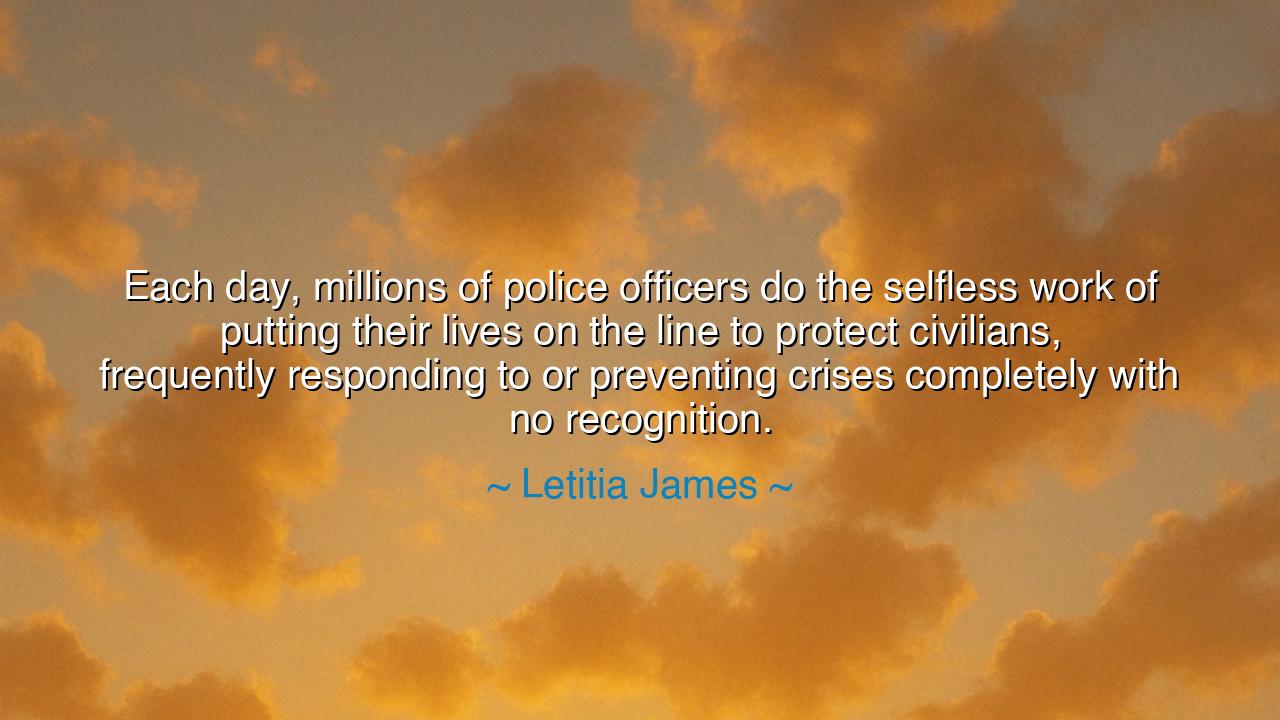
Each day, millions of police officers do the selfless work of
Each day, millions of police officers do the selfless work of putting their lives on the line to protect civilians, frequently responding to or preventing crises completely with no recognition.






The leader Letitia James once proclaimed: “Each day, millions of police officers do the selfless work of putting their lives on the line to protect civilians, frequently responding to or preventing crises completely with no recognition.” In this saying lies a hymn to duty and sacrifice, a remembrance of those who walk the perilous path for the sake of others. To protect is not merely an act, but a calling, one that demands the offering of comfort, safety, and even life itself.
The police officers, like guardians of old, stand at the threshold between order and chaos. They move not for glory nor for song, but for the quiet covenant they have sworn—to defend the weak, to shield the innocent, to answer when danger calls. In their daily march, they confront shadows so that others may walk in light. Yet, as James reminds us, such selfless work often passes unseen, unpraised by those who sleep in safety because of it.
The words also reveal the loneliness of this vocation. To face crises, to rush where fire, fear, and violence dwell, is to carry burdens that few can understand. Still, many who serve do so knowing that no laurel crown awaits, no applause greets their return. Their reward is not fame, but the silent knowledge that lives were preserved, that harm was turned aside. In this, they resemble the ancient watchmen upon the city walls—vigilant, steadfast, and largely forgotten.
But forgetfulness should not breed indifference. For a society that does not honor its protectors weakens the very bonds that hold it together. Let the words of Letitia James be a reminder to the generations: recognition is not mere courtesy—it is the nourishment that sustains courage. Gratitude is the incense that honors the unseen sacrifices of those who guard the gates.
Therefore, hold fast to this teaching: that selfless work, though unrecognized by the many, is never wasted. It is etched in the fabric of safety, in the laughter of children, in the peace of the night. And though the names of the guardians may fade, their deeds endure, written upon the hearts of those they have saved.






NHPham Thi Nhat Had
I agree with Letitia James that police officers often go without recognition for their hard work. Their bravery is unquestionable, but it also makes me wonder—are we doing enough to ensure their mental and emotional well-being? What happens when police officers face burnout or trauma due to the stresses of the job? How can we better support them while also making sure they have the right training and resources to handle complex situations responsibly?
NANg An
Letitia James’ words really stand out because they remind us of the silent, behind-the-scenes work that goes into policing. It’s easy to overlook these acts of bravery, but how do we give these officers the recognition they deserve without sensationalizing or oversimplifying their roles? And at the same time, can we address the need for reform and accountability without diminishing the importance of their sacrifices?
DMHa Duc Minh
This quote from Letitia James is a stark reminder of how much police officers do, often at great personal risk, to protect us. It makes me question, though—what happens when the work they do isn't recognized? Does it demoralize officers, or do they continue regardless because they believe in their duty? How do we, as a society, show appreciation without it turning into just empty praise or token gestures?
TNLieu Thuy Nga
Letitia James brings up an important point about the sacrifices police officers make every day. They’re often in dangerous situations, yet many of their efforts go unnoticed. But, I wonder—while recognizing their selflessness, how do we also ensure that police forces are held accountable for their actions? Can we balance showing appreciation for their service with maintaining transparency and trust within the community?
CPCuong phat
This quote really highlights the often-unseen work of police officers. The idea that they put their lives on the line every day, without expecting recognition, shows incredible dedication. However, it also makes me think—do we, as a society, do enough to recognize this kind of service? Should we be more vocal in acknowledging their sacrifices, or is there a danger in glorifying them too much without addressing the complexities of policing?